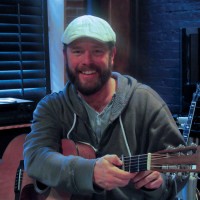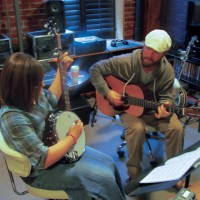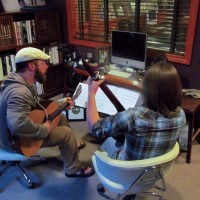Artist in Residence: David McDonald
- Details
- Published on Thursday, 01 March 2012 16:34
- Written by Paul Gordon
David McDonald is all about music - his way.
David McDonald knows who his worst enemy is: himself. But acknowledging that and trying to change it are too different things.
"I do sometimes make my life tougher for myself, tougher than maybe it needs to be, because I can't suck up. Some think it's arrogance. I don't know," said the candid owner of the Academy of Fretted Instruments. "I definitely do things my own way, but I think the end results speak for themselves. I'm not looking to change."
What he'd rather change is the trend away from teaching children music in the schools (learning instruments, mostly) which he believes is dangerous in that culture is being taken from those who need it most.
"There are so many things I want to do for the community, for the schools. I can't do it alone, but I can get some things started here and maybe in the schools. Somebody has to teach these kids," McDonald said during an interview at his studio inside the Contemporary Art Center, 305 SW Water St. in Downtown Peoria.
McDonald, 37, has been going his own way since he was a freshman at Morton High School and told his father, baseball coach Mike McDonald, he didn't want to play ball any more. Music was what he wanted to pursue instead (rock music, in particular, thanks to the influence of MTV) and he felt he had to grow his hair long and go barefoot and all the other trappings he imagined he needed to be taken seriously as a musician.
His parents, including his mother Peggy, a nursing instructor at Bradley University, supported his decision. "My dad said he'd rather have somebody who couldn't play third base as well but wanted to be there than somebody who could play it but didn't want to," he said.
Before then McDonald had taken enough piano lessons to know more than the basics, but he became more interested in guitar after an uncle showed him a few riffs and how to shape cords. With time away from music to pursue martial arts in the fourth and fifth grades, he returned to the guitar in junior high and has stuck with fretted instruments ever since.
Fretted instruments are stringed instruments such as a guitar or banjo that have strips going diagonally across the neck, known as frets, that help the fingers stop at the right places to produce certain tones.
McDonald now can play guitar, ukulele, mandolin and bass and teaches all of them at his studio. He said the guitar is the best for learning other fretted instruments. It takes the most skill, learning the way to shape cords and muscle memory. "If you learn the guitar first the others are going to be easier to learn," he said.
Muscle memory? "Oh, definitely. That's how you know, or rather how your fingers know, where the pick is supposed to land for each chord or note. It's how you learn to quickly find your spots when shaping chords. Muscle memory is one of the hardest and most frustrating things to master," he said.
That goes with learning that finger and hand movements need not be big or exaggerated when playing a fretted instrument. "Another one of the hardest things to learn is how subtle your movements can be and still produce the sound you want. You see these rock stars getting into the music and whirling their arms, landing the picks in just the right places every time. That takes muscle memory but it doesn't have to be that big," McDonald said.
The other instruments are played a little differently in the way they are strummed or picked, but muscle memory is just as important, he said.
"The ukulele is fast becoming the instrument of choice for people starting out on fretted instruments. It's inexpensive and still takes a lot of skill to make the music you want from it," he said.
The banjo and mandolin don't get as much interest, but both are fun to play, he said. "Those are instruments that are hard to put down once you learn them," he said.
One recent afternoon found Katie Moffitt of Canton in the AFI studio for a lesson on her banjo. The 15-year-old was already learning to play piano but her mother wanted her to learn more instruments to be more well-rounded. She chose the banjo. "I like it. It's fun," the shy teen said just before she and McDonald started to duet on a gospel song, with the teacher accompanying the student on the guitar.
Outside the studio, Kim Moffitt, Katie's mother, said she was surprised her daughter chose banjo after she had been leaning toward a reed instrument. But she supported the decision.
Next came finding an instructor. Kidder Music in Peoria gave her a list of names and after checking into instructors she chose McDonald because "I liked talking with him and I could tell he was knowledgeable. He has helped her a lot.
She has picked it up pretty quickly and it's because of his teaching style. He's straight with her, tells her like it is. He doesn't do it in a strict way, but in a way that pushes and motivates her. There's nothing wrong with that," she said.
His style, McDonald said, has rubbed others the wrong way in the past. Some believe he is abrasive. "I call it as I see it. I can be very stern with my words. Maybe that's from being the son of a coach. I find myself saying things my dad would say, like 'do it right or don't do it all,' or 'listen to what I say, not how I say it.' The thing is I don't like attitude or made-up excuses.
"I have lost students because of it. But I also feel they find I am their biggest cheerleader when they do recitals or concerts. Give me your best effort and you'll get mine," he said.
That's what he has asked from his students since he started teaching. That came after getting his bachelor of science degree in music, with a minor in theater, from Bradley University. The degree came after his second stint at Bradley, the first being interrupted by music, of course.
He was majoring in radio/TV communications with a minor in art when he got into a rock band that he and his band mates just knew was going to be their vehicle to rock stardom. "We got a bus and fixed it up with beds, the whole bit. We played a lot of places and were actually pretty good. But eventually it ended and I decided to go back to Bradley. I changed my major to music because I knew that I still wanted to do that with my life," McDonald said.
After earning his degree he taught part-time at Charter Oak School and felt he was making progress, teaching the younger ones to sing and getting the older students into instruments. Under his tutelage the school made a couple children's albums and raised money for a new sound system.
He then went to teach at Peoria Academy, but a year later was back at Charter Oak. "Let's just say we weren't meant for each other," he said of his time at Peoria Academy.
But cutbacks in music curricula at many schools caused McDonald to teach privately to make a living. He'd already been supplementing his income by teaching at Elmore Music Warehouse and later at Don's Musicland.
McDonald decided to open his own studio in order to be his own boss and teach his way. He chose the name Academy of Fretted Instruments, he said, because that's what it is. "I wanted an academic sounding name because they don't teach fretted instruments in schools. Somebody needs to," he said.
He still helps some schools and wants to grow that part of his work, as well. For example, he wants to do more children's albums and put focus on vocal soloists, while hoping to develop a scholarship program so they then can learn to play instruments on which they can accompany themselves, such as guitar or piano. That, McDonald said, is often an overlooked part of music but is the best way for a musician to support themselves.
McDonald also plans to open the Peghead School of Music within AFI, with drum and piano lessons at the outset. "It will be for instruments that have timing pegs," he said. He will have other instructors for those instruments.
Ideally, McDonald wants to get to the point where he and his other instructors are teaching only a day or two at AFI and spending more time going to various schools giving lessons. "Eventually we may be able to turn our place here into just a recording studio," he said.
He believes there is a future in teaching students at schools that have, because of money, been forced to abolish or curtail music curricula, if the schools get creative. "Music curricula can be too restrictive at times. If you are passionate about what you are doing you can come up with a million different ways to teach the same thing. Giving them the chance to learn is the key," he said.
More than anything he wants the art of teaching music to keep a personal touch. So far he has resisted becoming an online teacher, even though he knows more and more people are turning to the Internet to learn to play instruments because of convenience and cost.
"I sense the changes coming in technology in the music world, but to me there will never be anything like learning from and getting answers from a person, face-to-face in the same room. Subtle, little things can make such a difference, like when I see a student using too much tension when fretting their guitar. Email can't see that, email can't teach the importance of muscle memory by demonstrating it.
"I know the Internet can be very informative but it would be so easy to be consumed by electronics that you forget about personal contact, like being able to see their face when they get it, or to be able to congratulate them on the spot."
In what spare time he has, McDonald will still play the occasional concert or plan events such as Bluesology, a concert he sponsored the last two years at which he has played with some of his students as well as with other bands. He will continue building a life with his partner, Leah, and her two daughters.
And, he'll keep learning. "You're never too old to learn, whether it's a new instrument or just some subtleties with a guitar or banjo. I learned banjo from Dick Applegate, had lessons from him right up until he passed away. I'm learning something all the time and I hope I never stop," he said.





















































